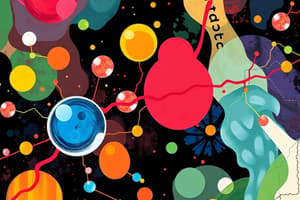Podcast
Questions and Answers
What is the sum total of all biochemical reactions in the body known as?
What is the sum total of all biochemical reactions in the body known as?
- Photosynthesis
- Metabolism (correct)
- Anabolism
- Digestion
Only 10 common amino acids are used to make proteins.
Only 10 common amino acids are used to make proteins.
False (B)
Name the four most common elements found in living organisms.
Name the four most common elements found in living organisms.
Hydrogen, carbon, oxygen, nitrogen
The basic skeletons of organic molecules are formed from __________ atoms.
The basic skeletons of organic molecules are formed from __________ atoms.
Match the following components with their description:
Match the following components with their description:
What is a significant feature of biochemistry?
What is a significant feature of biochemistry?
Chemical evolution refers to the process by which simple carbon-based molecules evolved into complex biological molecules.
Chemical evolution refers to the process by which simple carbon-based molecules evolved into complex biological molecules.
Simple biological molecules serve as the __________ for larger, complex biological molecules.
Simple biological molecules serve as the __________ for larger, complex biological molecules.
What is the primary function of carbon in biological molecules?
What is the primary function of carbon in biological molecules?
Flashcards are hidden until you start studying
Study Notes
Biochemistry
- Biochemistry examines the chemical reactions within biological molecules.
- Metabolism encompasses all biochemical reactions in an organism.
- A limited set of molecules (e.g., 20 amino acids for proteins) simplifies metabolic control.
- Molecular structure is closely linked to function.
Building Blocks of Life
- Hydrogen, carbon, oxygen, and nitrogen are the four most abundant elements in living organisms, comprising over 99% of atoms.
- Carbon's ability to form long chains and ring structures makes it crucial for building organic molecules.
- Organic molecules consist of carbon skeletons with other atoms attached, determining their function.
- A period of chemical evolution likely preceded life, where simple carbon-based molecules formed from even simpler ones.
- Simple biological molecules act as building blocks for larger, complex molecules.
Studying That Suits You
Use AI to generate personalized quizzes and flashcards to suit your learning preferences.




